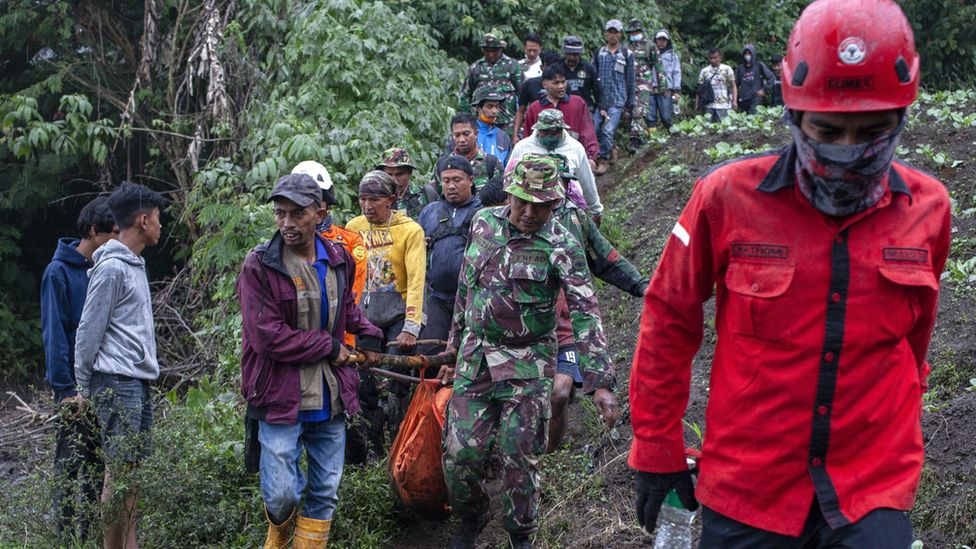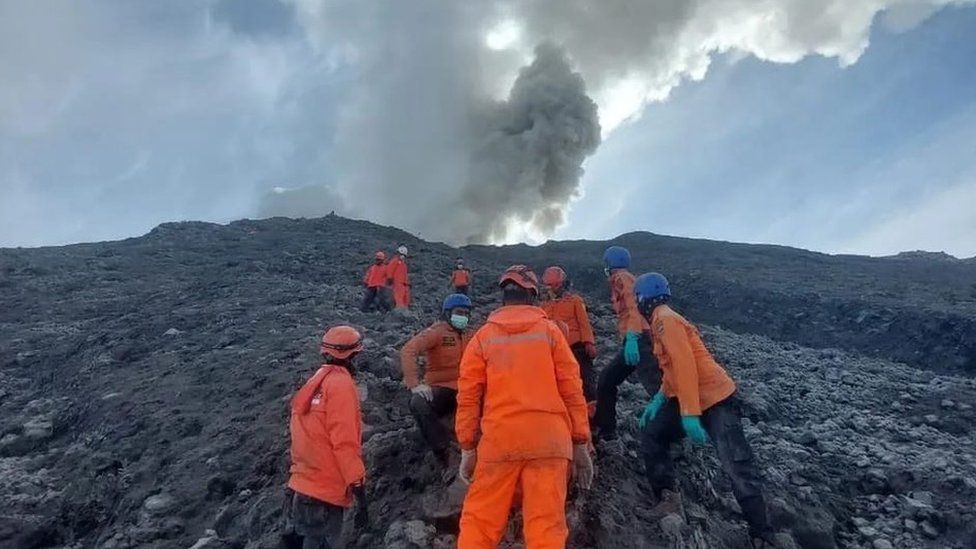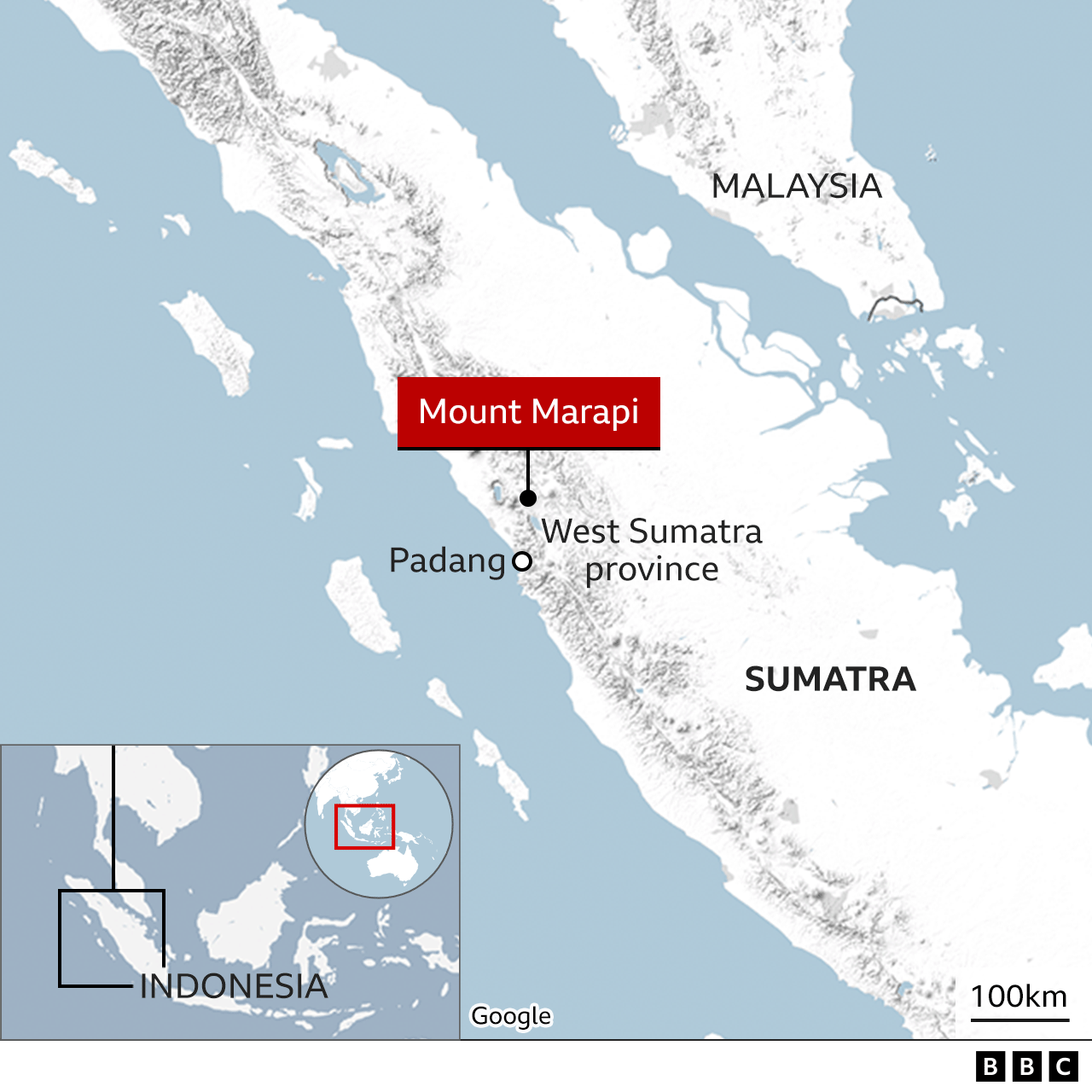The death toll from a volcanic eruption in Indonesia has gone up to 22, after rescuers found nine more bodies.
The search for the 10 missing hikers on Mount Marapi resumed on Tuesday after being paused due to safety worries.
Officials said that nine bodies had been recovered by afternoon, with one of them still missing. Twelve other injured hikers are undergoing treatment in hospital.
Frequent volcanic eruptions in Marapi have hampered rescue efforts for days.
Ahmad Rifandi, head of Marapi’s monitoring post, told AFP news agency that five eruptions had been recorded on Tuesday alone.
“Marapi is still very much active. We can’t see the height of the column because it’s covered by the cloud,” he said.
Rescuers told BBC News Indonesia they have been taking advantage of windows of relative calm to look for the missing and efforts to look for the last missing hiker would resume on Wednesday.

The volcano spewed a 3km (9,800ft) ash cloud into the air on Sunday, shrouding surrounding villages in ash.
There were 75 hikers in the area during the eruption, most of whom have been evacuated and received treatment for burns.
Mount Marapi, which means “Mountain of Fire”, is among the most active of Indonesia’s 127 volcanoes and is also popular among hikers. Some trails reopened only last June due to ash eruptions from January to February. Marapi’s deadliest eruption occurred in 1979, when 60 people died.
Video footage of Sunday’s eruption showed a huge cloud of volcanic ash spread widely across the sky, and cars and roads covered with ash.
On Monday, rescuers took turns carrying the dead and the injured down the mountain’s arduous terrain and onto waiting ambulances with blaring sirens.
“Some suffered from burns because it was very hot, and they have been taken to the hospital,” West Sumatra Disaster Mitigation Agency head Rudy Rinaldi said.

One of the hikers, Zhafirah Zahrim Febrina, appealed to her mother for help in a video message from the volcano. The 19-year-old student, whose nickname is Ife, appeared shocked, her face burnt and her hair matted with thick grey ash.
“Mom, help Ife. This is Ife’s situation right now,” she said.
She was on a hiking trip in Marapi with 18 school friends and is now in hospital receiving treatment.
Her aunt, Rani Radelani, told the BBC Indonesian service that her niece went through great trauma.
“We knew [where she was] because she called using her friend’s phone,” Ms Radelani said.
On the call, Ife could not stop crying. She complained that her skin felt hot because of the volcanic ash.
But Rani tried to encourage her niece not to give up. “She said that she was scared, hot, cold, and thirsty. I told her you have to be strong, you are tough,” Ms Radelani said.
Marapi is located on Sumatra, the westernmost and third largest of Indonesia’s 18,000 islands. It stands 2,891m (9,485ft) high.
The Indonesian archipelago sits on the so-called Pacific Ring of Fire, where the meeting of continental plates causes high volcanic and seismic activity.

Additional reporting by Hanna Samosir in Jakarta and Joel Guinto and Kelly Ng in Singapore

Are you personally affected by this story? Share your experiences by emailing [email protected].
Please include a contact number if you are willing to speak to a BBC journalist. You can also get in touch in the following ways:
- WhatsApp: +44 7756 165803
- Tweet: @BBC_HaveYourSay
- Upload pictures or video
By Jerome Wirawan in Jakarta and Zoya Mateen in London
BBC News
https://www.bbc.com/news/world-asia-67621787